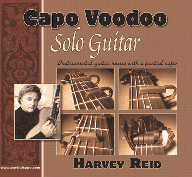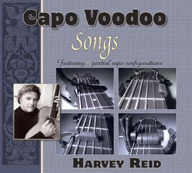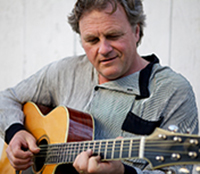Harvey Reid was the first modern guitarist to compose, publish and record guitar music with the partial capo, and these collections contain many of his most important recordings. He has used a partial capo on over 125 recorded tracks (out of over 400 total tracks) on his 27 albums, including 2 dozen configurations of various types of partial capos in a number of different tunings.
Previously, the references to the partial capos has been only small print in the liner notes of Reid's recordings, and now for the first time it is being put in big letters on the front.10 of the 18 tracks in Capo Voodoo:Solo Guitar are available in sheet music/TAB either in Harvey's books of partial capo arrangements, and now for the first time as individual sheet music.
Though he has mostly used the capos in standard tuning on guitar, Reid has also pioneered the use of the partial capo on 6-string banjo, octave mandolin and mandocello. "The Lucky Penny" showcases his amazing "faux-frailing" 6-string banjo style, done on a banjo tuned in standard guitar tuning.
From this beginning, the partial capo has now spread to thousands of guitarists on many continents who are busy exploring the new possibilites and fresh ideas that this simple tool gives to any guitarist.
Capo Voodoo:Solo Guitar is
a compilation of guitarist Harvey Reid's ground-breaking partial capo guitar work that spans 29 years from 1981 to 2010. Two of the tracks are re-recordings done in 2010 of earlier arrangements, one cut is unreleased, and the rest were remastered from earlier CD and LP releases.
Two tracks feature flatpicking; the rest are solo fingerstyle instrumental pieces that range from traditional fiddle tunes to classical pieces, airs, celtic pieces and Delta blues. There are 3 slide guitar pieces played on resonator guitars, 2 tracks played on 12-string, and the rest are 6-string acoustic guitars. 11 different steel-string instruments are featured.
Capo Voodoo:Songs features Reid's partial capo songs, since he has used it all along on songs as well as instrumental music. Currently the largest group of players that is using the partial capo is the singer/songwriters.
This CD takes a tour of Reid's songwriting and arrangements of traditional songs. The sparse, mostly solo acoustic guitar arrangements illustrate clearly the kinds of sounds Reid likes to pull from his guitars with the partial capos.
If you listen carefully to the music, you will notice that the guitar (except for the tracks that are played in open tunings combined with partial capos) has the familiar flavor of standard tuning, but has a noticeable added resonance due to the new landscape of open strings the capo produces. You'll also hear the flowing standard tuning scales, and the counterpoint bass lines moving against the melodies (such as you often hear in classical guitar) in ways that you don't normally hear in open-tuned guitar pieces. The partial capo offers the "best of both worlds" in that you get the ringing drones and haunting resonances that open tunings provide, but at the same time the scale & chord positions are generally those associated with standard tuning. This means that players who normally play in standard tuning can take advantage of their knowledge of the fingerboard while still getting a lot of the kinds of sounds that normally can only be done with non-standard tunings.
There are 9 other important partial capo tracks on Reid's other 2010 solo guitar compilations "The Solo Guitar Project: Vol 1-2" that are currently only available on digital download in their remastered versions, or on various older CD's. Any of them deserves to be on this collection, especially the epic 23-minute Esus piece from 1986 "The Minstrel's Dream." (Racing the Storm (H. Reid), Cindy/Cripple Creek (Trad.), Scotland Suite 1: Requiem (H. Reid, Pegasus (H. Reid), Archibald MacDonald of Keppoch (Trad.), Star Island Jig (H. Reid), Norway Suite 1: The Waterfall (H. Reid), Norway Suite 2: The Fjord (H. Reid), The Minstrel's Dream (H. Reid)
In addition to collecting and assembling these pieces, Reid
has also done some serious re-mastering of the original recordings, which has made a dramatic improvement.
When he began recording digitally in 1988, the appeal of the digital was that 1) there was little or no background
hiss, flutter or other noise 2) tape was cheap and 3) copies of recordings were identical to the originals. At
the beginning, digital recording offered a chance to capture music "alive" more effectively than analog,
because it could handle a much wider dynamic range, and there was no tape noise. (Here is a much longer
piece Reid wrote explaining remastering...)
|

Suite: for the Duchess (Reid) Für Elise (Beethoven) Arkansas Traveler (Trad.) The Albatross (Reid) Macallan’s Jig (Reid) Norway Suite 3 (Reid) Wildwood Flower (Trad.) The Unknown Soldier (Reid) Johnson’s Blues* (Reid) Hard Times, Come Again No More* (S. Foster) Slipped Through My Hand (Reid) The Lucky Penny (Reid) Red in the Sky* (Reid) Sly Damsel Serenade (Reid) Camptown Races/ Oh Susannah (S. Foster) Prelude: From Minstrel’s Dream (Reid)

LISTEN / BUY TRACKS ONLINE
Read the liner notes
|

Dreamer or Believer (Reid), St. James Infirmary (Trad.), From Where I Stand (Reid), How Can I Keep From Singing* (Trad.), The Cuckoo (Trad.), The Lakes Of Pontchartrain (Trad.), I Have Finally Found A Home (Reid), Once Upon A Time (Reid), Maybe Someday* (Reid), Farther Along (Trad.), A Very Old Song* (Reid), Roving Gambler (Trad.), Short Life Of Trouble (Trad.), Twilight (Reid), The Boatman (Reid)

|
 H
H



